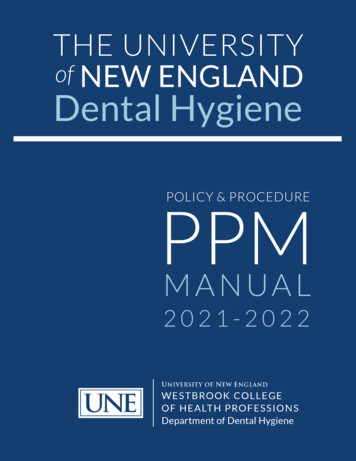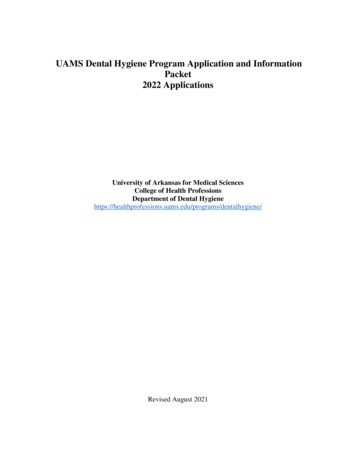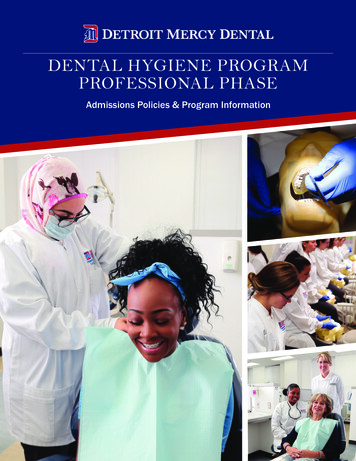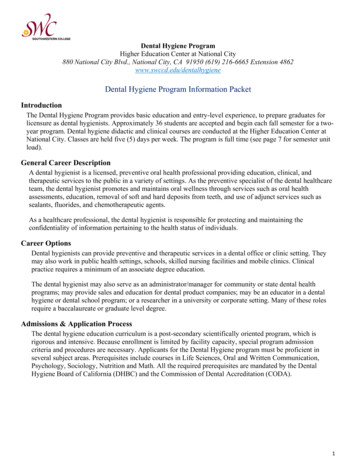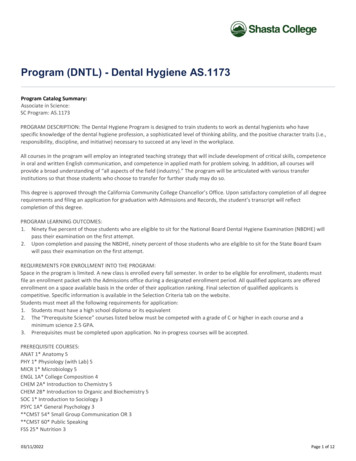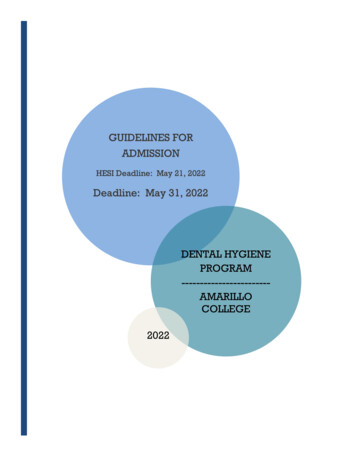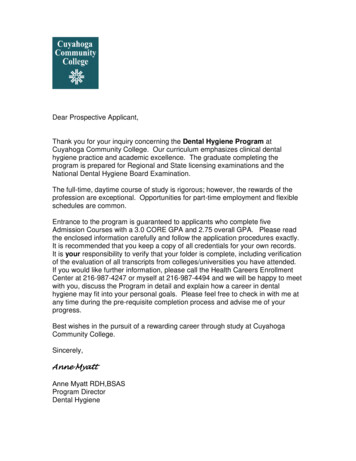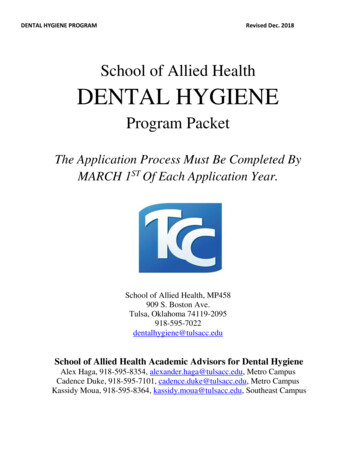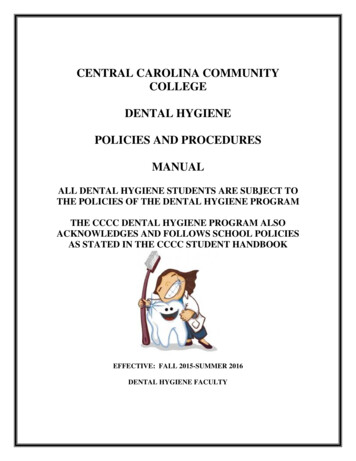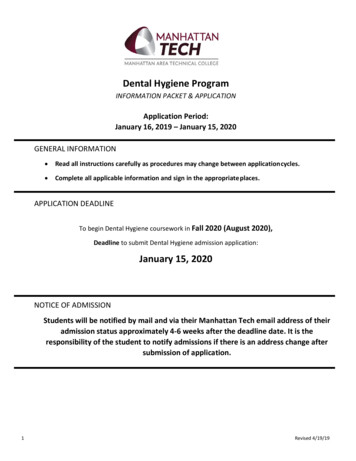
Transcription
Exhibit 2-7DENTAL HYGIENE PROGRAMHANDBOOKPLEASE NOTE: The policies and procedures contained within this manual are subject to changeat any time at the discretion of the Dental Hygiene Program Director. Students will be notifiedof such changes if and when they should occur.This student handbook supplements information presented in the Fortis Institute catalog. Acopy of the Fortis Institute catalog is provided to all students at the time of enrollment.Additional copies can be obtained from the front desk in the main building.1
Effective Date: July 9th, 2018Table of ContentsDental Hygiene Program Mission . 3Dental Hygiene Program Purpose . 3Dental Hygiene Program Goals and Competencies . 4Fortis Institute Scranton Student Dental Hygienist Code of Ethics. 6Notice of Opportunity to File Complaints . 7STUDENT RESPONSIBILITIES . 8Student Responsibilities . 9Professionalism . 9Confidentiality . 9Appearance and Dress Code: Classrooms and Outreach . 10Appearance and Dress Code: Clinic and Dental Laboratory . 10Personal and Oral Hygiene . 12Classroom Policies . 13Patient Pool . 16Dental Hygiene Clinic No Patient/Absentee Policy . 17STUDENT GRADING . 20Academic Progression . 21Grading/Evaluation Policies . 21Dental Hygiene Grading Scale . 22Clinical Evaluation . 22Clinical Requirements . 23Clinical Competency Evaluations, Requirements, and Completion Policy . 24Complaint or Dispute Procedure . 262
DENTAL HYGIENE PROGRAM MISSIONThe mission of the dental hygiene program is to educate and prepare students tobecome competent, licensed dental hygienists who will conduct themselves in an ethicalmanner while providing quality dental hygiene care to the community. The dentalhygiene graduate will have the foundation to pursue the roles of clinician,educator/health promoter, change agent, consumer advocate, researcher, andadministrator/manager in their professional activities.DENTAL HYGIENE PROGRAM PURPOSEPrepare individuals for employment as competent, entry-level practitioners whoseknowledge and skills satisfy current standards for the dental hygienist.3
PROGRAM CORE GOALS AND COMPETENCIESThe Dental Hygiene Student and Graduate will:Major Goal: To comprehensively prepare competent individuals in the Dental Hygienediscipline.I. Core Goal (C)The dental hygienist must possess the ethics, values, skills and knowledge integral to all aspects ofthe profession.CompetenciesC.1Apply a professional code of ethics and knowledge in all endeavorsC.2Adhere to state and federal laws, recommendations and regulations in the provisionof dental hygiene careC.3Communicate effectively with individuals and groups from diverse populationsC.4Communicate effectively with other healthcare professionals concerning the bestinterest of the patientC.5Provide accurate, consistent and complete research and documentation for servicesC.6Provide care to all patients using an individualized approach that encompasses theskills and knowledge obtained through educationII. Health Promotion and Disease Prevention Goal (HP)The dental hygienist needs to emphasize both the prevention of disease and effective health caredelivery.CompetenciesHP.1 Promote the values of oral and general health and wellness to the public by teachingproper dental care and oral hygiene instructionsHP.2 Respect the goals, values, beliefs, and preferences of the patient while promotingoptimal oral and general health to promote and teach patients disease preventionandhealth strategiesHP.3 Identify through research individual and population risk factors and developstrategies that promote health related quality of lifeHP.4 Evaluate factors that can be used to promote and teach patient adherence to diseaseprevention and health maintenance strategiesHP.5 Provide optimal interprofessional communication and educationIII. Community Involvement Goal (CM)Dental hygienists must appreciate their role as healthcare professionals providing a service in thelocal state and national levels. Through teaching, research, and service to the community, thedental hygienist must be prepared to influence others to facilitate access to care and services.CompetenciesCM.1 Assess the oral health needs of the community and the quality and availability ofresources and servicesCM.2 Provide community oral health education in a variety of settingsCM.3 Research and evaluate reimbursement mechanisms and their impact on thepatient’s access to oral health careCM.4 Research and evaluate the outcomes of community-based programs and plan forfuture activitiesIV. Patient Care Goal (PC)4
Central to the maintenance of health, the dental hygienists’ role in patient care is ever-changing.Utilizing the ADPIE format, dental hygiene graduates must use their skills to assess, diagnose, plan,implement and evaluate treatment.CompetenciesAssessmentPC.1 Systematically research, analyze, and record data on the general oral andpsychosocial health status of a variety of patients using methods consistent withmedicolegal principlesDiagnosisPC.2 Use critical decision making skills to reach conclusions about the patient’s dentalhygiene needs based on all available assessment data.PlanningPC.3 Collaborate with the patient and/or other health care professionals to formulate acomprehensive dental hygiene care plan that is patient centered and based oncurrentscientific evidence.ImplementationPC.4 Provide specialized treatment that includes preventive and therapeutic servicesdesigned to achieve and maintain oral healthEvaluationPC.5 Evaluate the effectiveness of the implemented clinical, preventive, and educationalservices and modify as neededV. Student Achievement Goal (SA)The dental hygienist should be a well-rounded and educated healthcare professional. Dentalhygiene graduates are exposed to multiple assessment modalities and consistent learningcompetencies through a comprehensive curriculum.CompetenciesSA.1 Identify various oral conditions by treating a multitude of patients and abiding tothe dental hygiene process of careSA.2 Use critical thinking exercises to interpret patient case studiesSA.3 Provide a variety of treatment services to patients within the states practice actSA.4Identify individual patient needs through thorough research activitiesVI. Professional Growth and Development Goal (PGD)A dental hygienist must be aware of a variety of opportunities for professional growth anddevelopment. Critical to ongoing growth are skills in teaching, communication, problem solving,critical thinking, and research.CompetenciesPGD.1 Develop practice management and marketing strategies to be used in the deliveryandteaching of oral health carePGD.2 Access professional networks to pursue professional goalsPGD.3 Update skills and knowledge by attending professional growth opportunitiesPGD.4 Mindfulness of current legislative activity regarding the professionPGD.5 Active involvement in professional organizations5
FORTIS INSTITUTE STUDENT DENTAL HYGIENIST CODE OF ETHICSUpon licensure, dental hygienists have a personal and societal obligation to uphold the Code of Ethicsfor the profession as set forth by the American Dental Hygienist Association (ADHA). This Code of Ethicsoutlines the professional behavior that is expected of all dental hygienists. As such, the Fortis InstituteDental Hygiene Program has designed a Student Dental Hygienist Code of Ethics, which was adaptedfrom that of the ADHA. Dental Hygiene students are expected to uphold this code at all times as theywork toward their future professions.As a Fortis Institute Dental Hygiene student: I will provide the best, non-discriminatory care possible for all patients regardless of age, sex,race, ethnicity, personal beliefs, religion, socioeconomic background, or health status.I will provide dental hygiene services in a safe, effective, and comprehensive manner.I will educate all of my patients on proper oral health care and disease control.I will work inter-professionally with patients’ health care providers when necessary to ensureappropriate dental hygiene care is given.I will explain oral health and disease findings to all patients so that they are informed oftreatment needs and oral health status.I will promote the Fortis Institute Dental Hygiene Clinic to improve access to dental hygiene carein the local community.I will consider the values and perspectives of patients before making decisions on their care.I will maintain professionalism to promote myself, my school, and my future vocation.I will preserve natural resources and respect the environment of my school and my communityas well as the global environment.I will treat others with respect.I will always be honest.I will maintain patient confidentiality.I will protect my patients and minimize harm to them whenever they are under my care orthrough the recommendations I make to them regarding their oral and overall health.I will allow my patients to make their own health choices.I will commit to current and lifelong learning and professional development to maintaincompetency.I will use the latest scientific and professionally acceptable information to ensure that allpatients receive safe, effective, and comprehensive care.I will communicate respectfully with all those I encounter.I will comply with local, state, and federal statutes that promote public safety.I will abide by Fortis Institute and Fortis Institute Dental Hygiene Department standards,policies, and procedures.6
NOTICE OF OPPORTUNITY TO FILE COMPLAINTSAll students registered in the Fortis Institute Dental Hygiene Program have the right toregister complaints related to the program’s compliance with accreditation standards withthe Commission on Dental Accreditation.The Commission on Dental Accreditation will review complaints that relate to a program'scompliance with the accreditation standards. The Commission is interested in the sustainedquality and continued improvement of dental and dental-related education programs butdoes not intervene on behalf of individuals or act as a court of appeal for treatmentreceived by patients or individuals in matters of admission, appointment, promotion ordismissal of faculty, staff or students.A copy of the appropriate accreditation standards and/or the Commission's policy andprocedure for submission of complaints may be obtained by contacting the Commission at211 East Chicago Avenue, Chicago, IL 60611-2678 or by calling 1-800-621-8099 extension4653.7
STUDENT RESPONSIBILITIES8
STUDENT RESPONSIBILITIESUnprofessional behavior that puts patients, students, faculty, or staff injeopardy, unprofessional attitudes, and/or negligence or infractions of any ofthe responsibilities, policies, and/or procedures mentioned in this handbookmay result in the student being dismissed from class or clinic/laboratorysessions in which the behavior occurred. Students dismissed from clinicsessions will receive a 0 for their clinical grade and will be marked absent for thesession. Absentee policies and penalties will apply as indicated within thishandbook, the instructor’s syllabus, and the Fortis Institute Catalog. Infractionsmay result in a failing course grade and/or possible withdrawal from the dentalhygiene program.PROFESSIONALISM1. A professional attitude is expected of each student during all personal interactions withpeers, faculty, and staff, as well as throughout all pre-clinical and clinical procedures.2. The primary objectives of the student dental hygienist are to participate fully in thelearning experience and provide quality preventive dental care to all patients.3. Patients and society look to the professional person for leadership and expect morethan a simple demonstration of good manners.4. Being professional requires interpersonal, inter-professional, and communityrelationships of high ethical standards.CONFIDENTIALITY1. Information that the dental hygiene student obtains from or about patients or studentpartners (e.g., medical and dental history, extra-oral/intraoral exam, periodontalcharting, dental charting, radiographs, etc.) must be considered privileged andconfidential information.2. Said information cannot be disclosed to a third party without the patient’s consent,except under the following circumstances:9
a. Information may be discussed with the clinic instructor or instructors directlysupervising the dental hygiene student.b. Information may be discussed with the parent or legal guardian of a minor childor an incompetent individual.3. Student is expected to be familiar with and abide by all current HIPAA regulations.APPEARANCE AND DRESS CODE: CLASSROOMS AND OUTREACH1. Instructors reserve the right to confer with students about their appearance, attire, andpersonal hygiene. Students may be dismissed from class for dress code infractions. Studentswill be marked absent from class for any time missed as a result. All institutional, departmental,and classroom absentee policies will apply.2. Students are expected to dress professionally at all times when on campus. Unacceptable attirefor the dental hygiene classroom includes:a. Shorts or short skirts/dressesb. Sweat pantsc. Cut-off shirtsd. Tank tops and spaghetti strapse. Sleeveless tops or dressesf. Flip flopsg. Pajama bottoms/lounge pantsh. Ripped/torn/tattered jeans, jean skirts, or other clothingi. Shoes with heels over 3 inches in heightj. Clothing with obscenities or otherwise inappropriate content (must be “all age”appropriate)k. Laboratory jacketsl. Soiled scrubs or other soiled clothingm. Scrubs that were not laundered after dental laboratory/clinical usen. Any clothing that is revealing or suggestive3. For all outreach activities, students are expected to dress in school issued grey scrubs that areclean, neat, and pressed. All students must wear their school I.D.APPEARANCE AND DRESS CODE: CLINIC AND DENTAL LABORATORY1. Instructors reserve the right to confer with students about their appearance, attire, andpersonal hygiene. Students may be dismissed from clinic or laboratory for dress codeinfractions. Students will be marked absent for any time missed as a result. All institutional,departmental, and classroom absentee policies will apply.2. Dosimeters must be worn at all times while in the clinic. Dosimeters should be surfacedisinfected at the end of the clinic session and stored in the designated area in central supply.3. Designated clinic attire (scrubs, lab coats, etc.) must be worn during clinical activities. Scrubsand lab coats should be clean, pressed, and wrinkle-free. Further, they must not have holes,10
bleach marks, stains, tears, or drag on the floor. They should fit comfortably and not be tight orform-fitting. No skin at the waistline should be exposed at any time while in clinic. Students areencouraged to keep an extra set of clean clinic attire in the locker room in case a change ofclothes is necessary. If a student is not appropriately attired, the student may be asked to leavethe clinic/lab until correct attire is worn. If this should occur, absences will be recorded on thestudent’s record and grades will be adjusted as per clinic grading guidelines.4. Contaminated clinic attire (lab coats) and Personal Protective Equipment (PPE) must not beworn outside the clinical area.5. Socks must be worn in the clinic at all times and must cover exposed legs (no bare leg should beobserved when operator sits in the chair). Socks must be white and mid-calf or knee length.6. Soiled clinic scrubs and lab coats must be taken off and brought home to be laundered in adisposable bag.7. Shoes must be constructed of all-white, non-porous material that permits disinfection afterclinical experiences. Shoes must be clean, closed-toe, closed and low-heeled, quiet,comfortable, and offer good support. They should have non-marking soles. Students must havea single pair of shoes designated for clinical use. These shoes should be stored in a plastic bag orshoe box in the locker room when not being worn in clinic and should not be worn outdoors.8. Strong perfume, body lotion, aftershave, cologne, and hair spray may trigger asthma andallergies in some patients and are not permitted in clinic.9. Chewing gum, eating, and/or drinking are not allowed while in the clinical or dental lab setting.10. Students must avoid entering the clinic areas smelling of cigarette smoke. Students are NOTpermitted to smoke while in uniforms/scrubs during ANY clinic session.11. Hair must be clean, neat, and styled daily. For clinical lab classes, long hair must be pulled off ofthe collar and not fall into the field of operation, nor interfere with the student’s or facultyobserver’s field of vision. If hair retainers are necessary, they should be clean, secure, andconservative and able to be washed or properly disinfected. Hair retainers with stones, sequins,jewels, or similar decorations are not permitted.12. Finger nails must be well manicured and short so as not to interfere with instrumentation,penetrate gloves, or injure clients’ tissues. Nail tips should not be seen over the tips of fingers.No artificial, acrylic tips or gel overlays allowed. Fingernail polish must not be worn.13. Only complementary conservative makeup should be worn and should be carefully applied priorto entering the clinic setting.11
14. Moustaches and beards must be clean at all times and trimmed to an appropriate length.15. False eyelashes and hairpieces are not permitted.16. All tattoos must be covered in the clinical setting.17. Hands should be clean at all times and free from nicks, scratches or other open, abraded orweeping lesions. Cuticles should be healthy and well-manicured. Students are encouraged toconsult with the faculty if unhealthy conditions, lesions, or wounds are present.18. Jewelry should be kept to a minimum:a. No facial or oral jewelry is to be worn on campus (including, but not limited to, nose, lip,eyebrow, tongue, etc.).b. Only one pair of post earrings worn on the earlobe is allowed. Dangling, off-the-lobeearrings, earrings in cartilage, or ear-gauges should not be worn.c. A watch constructed of plastic or synthetic non-porous material may be worn. It shouldbe disinfected at the end of each clinic day.d. Wedding bands may be worn in clinic as long as they are solid gold or other metal anddo not have diamonds, stones, or deep grooves.e. No other jewelry is permitted when a student is in preclinical or clinic attire; thisincludes rings, necklaces, and ankle bracelets.PERSONAL AND ORAL HYGIENE1. No smoking is allowed in any classroom or clinic area. Outdoor smoking is prohibited in the frontof the building. Students are not permitted to smoke while in uniform during any clinicalsession.2. Due to the fact that it is not always possible to predict a patient’s reaction to the smoke on astudent’s clothing, hair, or person, smoking will not be permitted during clinic hours. This policyreflects the Dental Hygiene Department’s concern for the welfare of the patients that thestudents serve. If any student needs assistance with smoking cessation or has questionsregarding this policy, please contact the Program Director.3. The oral hygiene of the dental hygiene student should represent the ideals of good dentalhealth. Routine dental care and daily oral hygiene are imperative.4. Students must be showered daily and use preventive measures to maintain cleanliness andpersonal hygiene at all times.12
CPR/BLS PolicyFortis Institute is committed to providing a safe and secure environment for its employees, students,patients, and visitors. Fortis Institute maintains the highest standards of care for our patients, whichincludes training of clinic faculty, staff, and students to recognize and appropriately manage medicalemergencies.CPR/BLS Training RecordsThe program director will maintain a file of all students, clinic faculty, and clinic staff reflecting the statusof their BLS skills training.It is the individual responsibility of each student, faculty/staff member to make sure this file is updatedand current.Students are responsible for providing the Program Director with a copy of their AHA CPR/BLS coursecompletion card.Students will not be allowed to participate in clinical experiences with expired CPR/BLS certification.Individuals with expired cards must enroll in the next available class. Students missing clinic sessions willbe given a zero for a grade and will need to make up the clinic session.Any student not having a current CRP/BLS certification faces dismissal from the dental hygiene program.Drug TestingAll students are required to undergo a drug screening upon entering the dental hygiene program.Unannounced drug screenings can occur periodically throughout the program. If a student is requestedto perform a drug screening, they will have 24 hours to complete the screening. If the drug screening isnot completed in 24 hours, the student faces dismissal from the dental hygiene program. Any studentwho fails the drug screening will be automatically dismissed from the dental hygiene program.ImmunizationsImmunization requirements are generally based on the current recommendations of the Centers forDisease Control (CDC) for health-care workers and the Advisory Committee on Immunization Practices(ACIP). Clinical agencies may have additional health clearance and immunization requirements beyondthe current recommendations outlined by the CDC or Institute policy. The Institute has identified astandard immunization policy, but reserves the right to require additional healthcare clearanceassessment, documentation, immunization, and serology testing at any point throughout the enrollmentof the dental hygiene program. In addition, immunizations and health requirements may changewithout notice and students may be required to provide verifiable documentation of their ability tomeet new requirements. Failure to meet this requirement may result in failure to progress in the dentalhygiene program. Students may be responsible for the cost of any additional requirements. Students arenot permitted to participate in any clinical experiences if their immunizations do not meet the standardsoutlined in this document or those required by specific clinical agencies.Vaccination/Screening Requirements in BriefHepatitis B Serologic proof of immunity is required. Three dose series (dose #1 now, #2 in 1 month, and #3 approximately 5 months after #2). Obtain serologic testing 2 months after dose #3.MMR Serologic evidence of immunity or laboratory confirmation of disease is required. If no evidence of immunity or equivocal serology results is reported, two doses of MMR at least28 days apart required.13
Varicella (Recommended but not required) Serologic proof of immunity or laboratory confirmation of disease required. If no evidence of immunity or equivocal serology results is reported, two doses of Varicellavaccine at least 28 days apart required.Tetanus, Diphtheria, Pertussis One-time dose of Tdap is required. Td boosters every 10 years thereafter.Influenza Recommended annuallyTuberculin Skin Test (TST) For students with no history of previous annual tuberculin skin testing, an initial two-step isrequired. For those students with previous annual and current testing who provide evidence bydocumentation, only a one-step is required. Testing must be within the past 90 days. For students with a positive tuberculin skin test, a current chest xray (within the past two years)or serological evidence of no active disease must be provided.Disclosure of Infectious Disease Status The Institute requires students who suspect or know themselves to be positive for certain infectiousdiseases to disclose that information to the Program Director upon admission to the Institute orwhen first suspected or confirmed. The infectious diseases to be reported include, but are notlimited to; Hepatitis A, Hepatitis B, Hepatitis C, and Tuberculosis. While Florida Statutes 760.37 and760.50 prohibit "interference, coercion, intimidation or discrimination" on the basis of HIVseropositivity, CDC guidelines state that HIV positive dentists should seek counsel from an expertpanel. Therefore, in compliance with these guidelines, students who are HIV antibody positive areencouraged to reveal their seropositive status and seek counseling and early treatment. Knowledge of an infectious disease should be disclosed by the student to a faculty member orcolleague upon review of the student's medical history prior to that student receiving dentaltreatment.Infectious Disease PolicyFortis Institute – Scranton operates in compliance with OSHA’s Bloodborne Pathogens Standard (29 CFR1910.1030). This standard is the facilities’ policy to protect students and healthcare employees fromoccupationally acquired exposure to blood and other potentially infectious materials. Implementation ofvarious methods of exposure control include universal precautions, engineering and work practicecontrols, personal protective clothing and equipment, Radiation exposure controls, housekeeping,vaccinations, training, and documentation.14
Procedures to Prevent Transmission of Infectious DiseasesStudents, faculty and staff shall routinely adhere to universal precautions including, the appropriate useof hand washing, protective barriers, and care in the use and disposal of needles and other sharpinstruments.Gloves, mask and protective eyewear (goggles or protective face shields) shall be worn during all patientcontacts and most preclinical procedures (at faculty discretion). Gloves shall be changed after contact with each patient or as procedures or glovedefects dictate. Torn gloves shall be replaced as soon as discovered. Hands shall be washed and dried before gloving and immediately after de-gloving. Students shall routinely wear clean surgical scrubs and cover gowns for each patientcontact that has the potential to disseminate blood and/or saliva. Students, faculty, and staff who have exudative lesions or weeping dermatitis shallrefrain from all direct patient care until the condition resolves. As determined on a case by case basis by the Program Director, individuals in thefollowing categories may be declared exempt from providing dental or supportiveservices for known infectious patients. Students, faculty, or staff with compromised immune systems, (i.e. anillness and/or taking medications such as steroids or otherimmunosuppressants). Pregnant students, faculty, or staff.Noncompliance with Infection Control PolicyStudents: Initial failure by a student to comply with infection control policies shall be recognized andhandled immediately upon discovery by faculty. Faculty shall provide counseling and directcorrective action appropriate for the protocol violation. The health and safety of thefaculty, staff, students and patients must not be compromised. The Program Director shallbe notified of the incident. Continued failure by a student to comply with infection control policies will result in initialreview by the Program Director and conduct probation. Non-compliance will be consideredas academic incompetence.Patients: Patient noncompliance or falsification of the historical medical record may result indismissal from the Fortis Institute Dental Hygiene clinic by the supervising dentist andProgram Director. Follow-up measures (i.e. referral to private practice), will be coordinated by the ClinicDentist.Student Health Requirements It is essential that the dental
appropriate dental hygiene care is given. I will explain oral health and disease findings to all patients so that they are informed of treatment needs and oral health status. I will promote the Fortis Institute Dental Hygiene Clinic to improve access to dental hygiene care in the local community.
